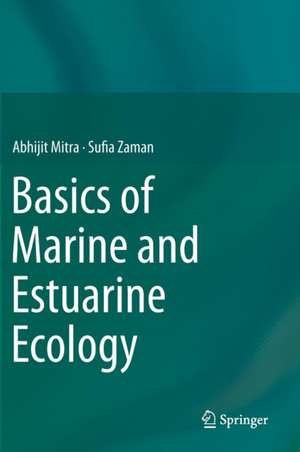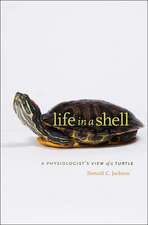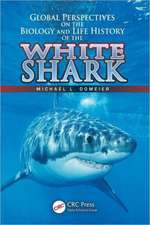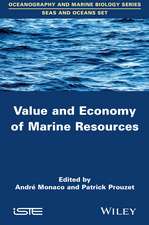Basics of Marine and Estuarine Ecology
Autor Abhijit Mitra, Sufia Zamanen Limba Engleză Hardback – 10 feb 2016
The “blue soup” of Planet Earth, which comprises both biotic and abiotic components, is essential to keeping the wheel of civilization running. Four major ecosystem service categories have been identified within this context, namely provisioning services such as water, food, mangrove timber, honey, fish, wax, fuel wood, fodder and bioactive compounds from marine and estuarine flora and fauna; regulating services such as the regulation of climate, coastal erosion, coral bleaching and pollution; cultural services encompassing recreational (tourism), spiritual and other non-material benefits; and supporting services such as nutrient cycling and photosynthesis. These valuable services are obtained from various resources that must be conserved for the sake of humanity. This book presents data for each resource type, not just in the form of a simple description, but also through case studies that resulted from several research projects and pilot programs carried out in different parts of the world. Statistical tools were also used to critically analyze the influence of relevant hydrological parameters on the biotic community. Advanced research in marine and estuarine ecology is based on the use of sophisticated instruments, sampling precision, statistical tools, etc., which have also been highlighted in the book.
| Toate formatele și edițiile | Preț | Express |
|---|---|---|
| Paperback (1) | 959.67 lei 6-8 săpt. | |
| Springer India – 31 mar 2018 | 959.67 lei 6-8 săpt. | |
| Hardback (1) | 967.22 lei 6-8 săpt. | |
| Springer India – 10 feb 2016 | 967.22 lei 6-8 săpt. |
Preț: 967.22 lei
Preț vechi: 1179.53 lei
-18% Nou
Puncte Express: 1451
Preț estimativ în valută:
185.10€ • 190.96$ • 156.66£
185.10€ • 190.96$ • 156.66£
Carte tipărită la comandă
Livrare economică 05-19 martie
Preluare comenzi: 021 569.72.76
Specificații
ISBN-13: 9788132227052
ISBN-10: 8132227050
Pagini: 825
Ilustrații: XII, 483 p. 401 illus., 218 illus. in color.
Dimensiuni: 178 x 254 x 27 mm
Greutate: 1.07 kg
Ediția:1st ed. 2016
Editura: Springer India
Colecția Springer
Locul publicării:New Delhi, India
ISBN-10: 8132227050
Pagini: 825
Ilustrații: XII, 483 p. 401 illus., 218 illus. in color.
Dimensiuni: 178 x 254 x 27 mm
Greutate: 1.07 kg
Ediția:1st ed. 2016
Editura: Springer India
Colecția Springer
Locul publicării:New Delhi, India
Public țintă
ResearchCuprins
Chapter 1: Marine ecosystem: An overview.- Chapter 2: Estuarine ecosystem: An overview.- Chapter 3: Physical processes in the marine and estuarine ecosystems.- Chapter 4: Abiotic variables of the marine and estuarine ecosystems.- Chapter 5: Producers of the marine and estuarine ecosystems.- Chapter 6: Consumers of the marine and estuarine ecosystems.- Chapter 7: Decomposers of the marine and estuarine ecosystems.- Chapter 8: Adaptation of marine and estuarine organisms.- Chapter 9: Hotspots of marine and estuarine ecosystems.- Chapter 10: Threats and conservation.- Chapter 11: Marine and estuarine ecosystems: Economic opportunities and risks.- Chapter 12: Instruments and methods.
Notă biografică
Dr. Abhijit Mitra, Associate Professor and former Head, Dept. of Marine Science, University of Calcutta (INDIA) has been active in the sphere of Oceanography since 1985. He obtained his Ph. D as NET qualified scholar in 1994. Since then he joined Calcutta Port Trust and WWF (World Wide Fund for Nature-India), in various capacities to carry out research programmes on environmental science, biodiversity conservation, climate change and carbon sequestration. Presently Dr. Mitra is serving as the advisor of Oceanography Division of Techno India University, Kolkata. He has to his credit about 325 scientific publications in various National and International journals, and 28 books of postgraduate standards. Dr. Mitra is presently the member of several committees like PACON International, IUCN, SIOS, Mangrove Society of India etc. and has successfully completed about 16 projects on biodiversity loss in fishery sector, coastal pollution, aquaculture, alternative livelihood, climate change and carbon sequestration. Dr. Mitra also visited as faculty member and invited speaker in several Universities of Singapore, Kenya, Oman and USA. In 2008 Dr. Mitra was invited as visiting fellow at University of Massachusetts at Dartmouth, USA to deliver a series of lecture on Climate Change. Dr. Mitra also successfully guided 24 Ph.D students. Presently his research areas include environmental science, mangrove ecology, sustainable aquaculture, alternative livelihood, climate change and carbon sequestration.
Dr. Sufia Zaman, presently serving as Adjunct Assistant Professor in the Department of Oceanography in Techno India University (Kolkata) started her career in the field of Marine Science since 2001. She worked in the rigorous region of Indian Sundarbans and has wide range of experience in exploring the floral and faunal diversity of Sundarbans. She has published 3 books on carbon sequestration, 75 scientific papers and contributed chapters in several books on biodiversity, environmental science, aquaculture and livelihood development. Dr. Zaman is presently a member of Fisheries Society of India. She is also running projects on carbon sequestration by mangroves of Indian Sundarbans. She is the recipient of DST Women Scientist and Jawaharlal Memorial Doctoral fellowship awards. Her areas of research include aquaculture, fish nutrition, phytoplankton diversity, climate change mangrove ecology and alternative livelihood. Dr. Zaman is also the first researcher in the maritime state of West Bengal (India), who initiated trial experiments on iron fertilization and subsequent enhancement of primary (phytoplankton) and secondary (fish) productions in the brackish water ponds of Indian Sundarbans with the financial assistance of Department of Science and Technology, Government of India. Dr. Zaman is also providing consultancy on green technology to several industries, NGOs and corporate sectors.
Dr. Sufia Zaman, presently serving as Adjunct Assistant Professor in the Department of Oceanography in Techno India University (Kolkata) started her career in the field of Marine Science since 2001. She worked in the rigorous region of Indian Sundarbans and has wide range of experience in exploring the floral and faunal diversity of Sundarbans. She has published 3 books on carbon sequestration, 75 scientific papers and contributed chapters in several books on biodiversity, environmental science, aquaculture and livelihood development. Dr. Zaman is presently a member of Fisheries Society of India. She is also running projects on carbon sequestration by mangroves of Indian Sundarbans. She is the recipient of DST Women Scientist and Jawaharlal Memorial Doctoral fellowship awards. Her areas of research include aquaculture, fish nutrition, phytoplankton diversity, climate change mangrove ecology and alternative livelihood. Dr. Zaman is also the first researcher in the maritime state of West Bengal (India), who initiated trial experiments on iron fertilization and subsequent enhancement of primary (phytoplankton) and secondary (fish) productions in the brackish water ponds of Indian Sundarbans with the financial assistance of Department of Science and Technology, Government of India. Dr. Zaman is also providing consultancy on green technology to several industries, NGOs and corporate sectors.
Textul de pe ultima copertă
The book presents recent research on marine ecology in different parts of the world. It aims to shed light on relevant topics for budding marine ecologists.
The “blue soup” of Planet Earth, which comprises both biotic and abiotic components, is essential to keeping the wheel of civilization running. Four major ecosystem service categories have been identified within this context, namely provisioning services such as water, food, mangrove timber, honey, fish, wax, fuel wood, fodder and bioactive compounds from marine and estuarine flora and fauna; regulating services such as the regulation of climate, coastal erosion, coral bleaching and pollution;cultural services encompassing recreational (tourism), spiritual and other non-material benefits; and supporting services such as nutrient cycling and photosynthesis. These valuable services are obtained from various resources that must be conserved for the sake of humanity. This book presents data for eachresource type, not just in the form of a simple description, but also through case studies that resulted from several research projec
ts and pilot programs carried out in different parts of the world. Statistical tools were also used to critically analyze the influence of relevant hydrological parameters on the biotic community. Advanced research in marine and estuarine ecology is based on the use of sophisticated instruments, sampling precision, statistical tools, etc., which have also been highlighted in the book.
The “blue soup” of Planet Earth, which comprises both biotic and abiotic components, is essential to keeping the wheel of civilization running. Four major ecosystem service categories have been identified within this context, namely provisioning services such as water, food, mangrove timber, honey, fish, wax, fuel wood, fodder and bioactive compounds from marine and estuarine flora and fauna; regulating services such as the regulation of climate, coastal erosion, coral bleaching and pollution;cultural services encompassing recreational (tourism), spiritual and other non-material benefits; and supporting services such as nutrient cycling and photosynthesis. These valuable services are obtained from various resources that must be conserved for the sake of humanity. This book presents data for eachresource type, not just in the form of a simple description, but also through case studies that resulted from several research projec
ts and pilot programs carried out in different parts of the world. Statistical tools were also used to critically analyze the influence of relevant hydrological parameters on the biotic community. Advanced research in marine and estuarine ecology is based on the use of sophisticated instruments, sampling precision, statistical tools, etc., which have also been highlighted in the book.
Caracteristici
Oceanography/Marine Science/Marine Ecology is an emerging discipline in the sector of higher education and research Relevant case studies at the end of each chapter (in the form of Annexure) may serve as road map for budding scientists and researchers Brain churner' section at the end of each chapter will prepare the students for national and international level competitive examinations











